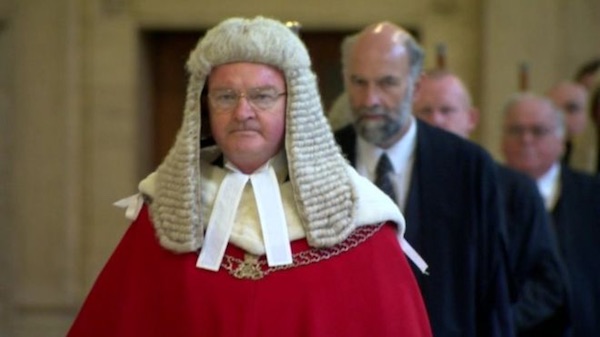
Sinn Fein’s Deputy First Minister Martin McGuinnness accused the British government of not being serious about dealing with the legacy of the past after the most senior judge in the North admitted Britain was ignoring its legal obligation to ensure blocked inquests go ahead.
Lord Chief Justice Declan Morgan said that the British government and Stormont Executive must address 56 ‘legacy’ inquests involving 98 deaths. He said a failure to do so would “frustrate the rule of law”.
Earlier this year, Justice Morgan announced a plan he said would result in those inquests being heard within five years, but the DUP blocked funding. “I hoped that in due course that the parties would be able to find a way forward, both those here within Northern Ireland and the secretary of state’s office, but unfortunately so far that hasn’t occurred,” he said this week.
Britain’s governor in Ireland James Brokenshire could provide funding for the initiative, but has chosen not to do so. Martin McGuinness said it was clear that the state is “under a legal obligation” to act as quickly as possible.
“If the various agencies who are involved in examining this from a political point of view cannot reach an agreement then the danger is that the political process will end up frustrating the rule of law,” he said.
“The parties, it seems to me, who are involved in these discussions need to take into account that there is a need for reasonable expedition, so it is up to them, it seems to me, to address this matter urgently so as to ensure that they comply with the legal obligations that all of us face in this area.
“This is not just a matter of policy, there is actually a legal obligation in relation to the legacy inquests.”
On Monday, Sinn Fein’s Gerry Kelly told the BBC it was “appalling” that the families of those involved in the legacy inquests had not had their cases heard.
He told the BBC the fact that ‘national security’ was being used to prevent the release of information was illustrated by the government’s attitude to releasing details about the McGurk’s Bar bombing in 1971, in which 15 Catholics were killed in a UVF attack.
“If you want to make a judgement on where the British government is, or where James Brokenshire is, then look at the McGurk’s bar bombing,” he said.
“The families have been waiting this length of time, 45 years, for this. They’ve (the government) just said that there is information and evidence which will not be released to the public until 2056. That means they will have to wait 85 years. They are clearly waiting for people to die.”
Morgan said: “I’m not surprised that the families feel incredibly frustrated by the process.
“I may be disappointed that the work that we have done has not yet come to fruition, but for the families their degree of frustration having lived with these issues for so long must be all the greater and I recognise that.”
He rejected the DUP suggestion that he is seeking special treatment for victims of state killings. He said: “I don’t see why the wider political agreement should not be addressed now. All the victims and survivors need this issue to be grasped” .
Meanwhile, the Ballymurphy massacre families have won a right to challenge for inquest funding. The families of ten people shot dead by soldiers in west Belfast 45 years ago were granted leave to seek a judicial review against the Stormont Executive and the British Government.
They are also among the victims of the continued British refusal to release resources for the backlog of tribunals. Barrister Fiona Doherty QC said: “These legacy inquests have been sucked into the pernicious politics of this jurisdiction. Its time for the court to exercise it’s constitutional role and uphold the rule of law.”
![[Irish Republican News]](https://republican-news.org/graphics/title_gifs/rn.gif)
![[Irish Republican News]](https://republican-news.org/graphics/title_gifs/harp.gif)

